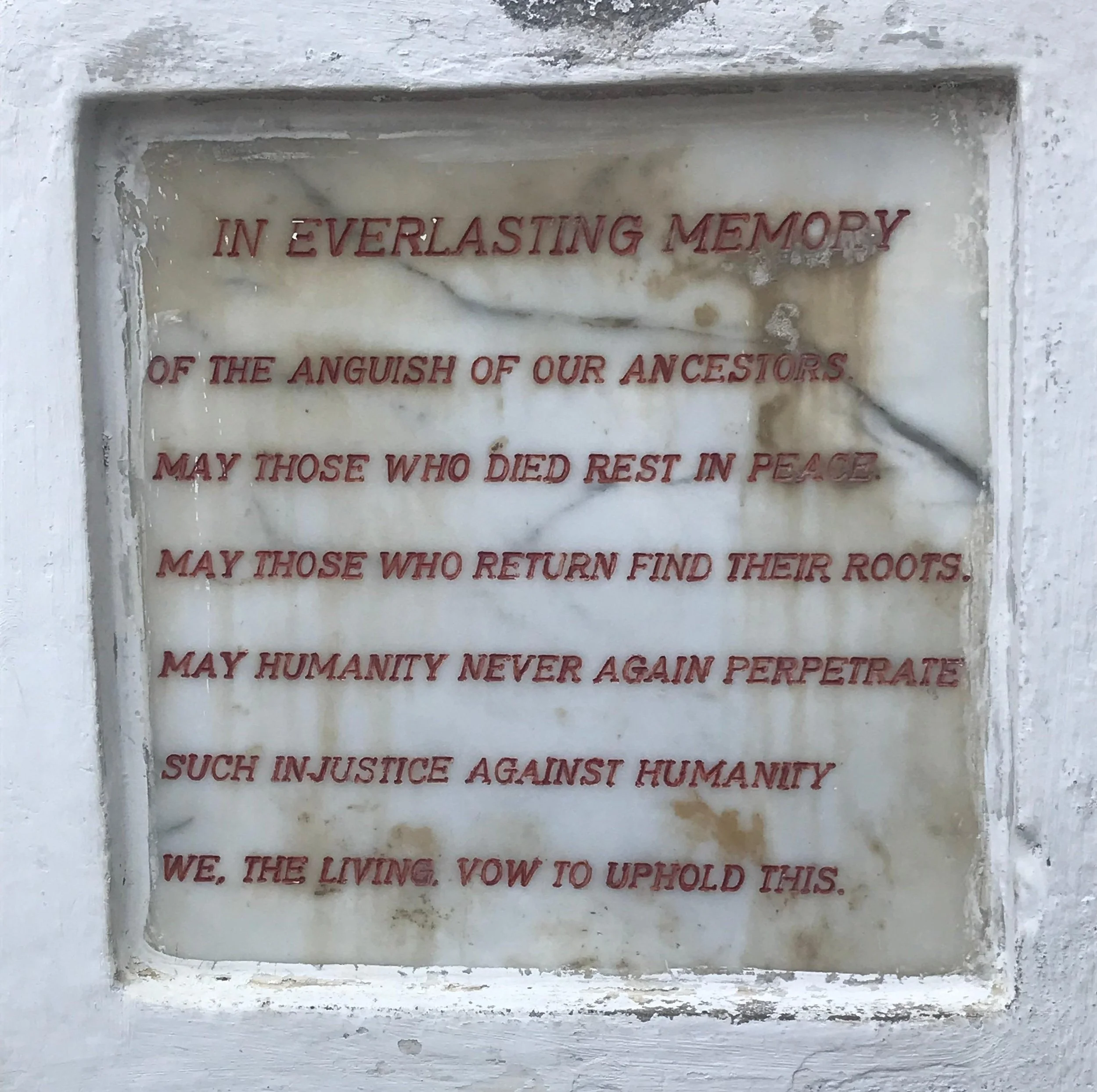I am nervous to listen to the voice recording I made while at Cape Coast Castle this afternoon. Okay, here it goes. Below is a transcription with edits, what I would add and change if I rerecorded it. You can listen to the unedited voice recording here:
I'm here at Cape Coast. It's a fortress and a dungeon built in the 1600s. We went into the dungeons where the male captives were held, 150 to 200 in a room, before being loaded onto slave ships. The brick floor is coated with everything that the human body excretes: urine, feces, sweat, blood. Yvette fainted. I thought she had a heart attack. I was so scared.
Maybe you can hear the waves against the rocks.
I felt so bad for bringing her here. I didn't know if I should try to comfort her, being a white person. I feel like I've been given so much grace in being allowed to come here with the group, this multicultural, multiracial group. I remember one of my students at Mills, a white girl, went to Côte d'Ivoire and the group asked her not to go to the slave fort with them. I feel that I've been given a lot of grace. Akosua held my hand in the dungeon, and my arm, and just while I was sitting here by the canons looking over the sea, Vallis came and sat next to me to make sure I was okay. They're both Ghanaians. There are also African Americans in our group, and other white Americans.
Slavery feels real here in a way that it doesn't for me in the U.S. What really struck me is that it's only been 190 years since the end of the slave trade, and 35 of those years I've been alive. That doesn't seem very long, and when our guide said these floors are 190 years old, the wood shutters are 190 years old, it just didn't seem that long ago. And that's scary.
I think everyone, everyone, in the U.S. needs to come here. Or at least the white people. I can't believe we haven't addressed slavery. It's something we white people just want to pretend didn't exist, cover up in our classrooms and in our history.
I don't understand how people can be so evil. I don't understand why this could have happened. I can't wrap my head around it. I hate that I'm on the side of the evil people, being white, descendent of the perpetrators. Tete said there's no place for guilt. Of course it's not my fault, but then again everything in the U.S. is structured around this, and the advantages I've had in my life, who knows how many of them can be traced back to slavery and to racism. It's disgusting. And it's so hard to talk about in the U.S., it's so hard. It's such a blessing to be with this group where I don't feel blamed. In the U.S., my assumption is just that African Americans hate me; I don't know how to interact with them, it's uncomfortable. I mean, it's probably the wrong assumption, I don't know.
Ghana was the first African country to officially apologize for the role that some Africans played in the slave trade. There is a plaque commissioned by the Ghanaian government at the entrance to the dungeon.
There is nothing from the U.S., or any European country. There is a plaque on the other side of the dungeon entrance commemorating a visit from President Obama, but no apology. And yet our guide ends the tour by taking us out through the Door of No Return, by which the captives left their homeland forever, and then bringing us back again through what is now called the Door of Return. Another act of grace, yet this one feels so big I don't know what to do with it. Our guide tells us we are not here to incite violence, we are not here to traumatize ourselves, but to remember, and to make sure we never participate in any forms of slavery that are going on today. He ushers us back, stands by the word "akwaaba" inscribed in marble on the wall, the Twi word for "welcome." How can I, a white person, be welcomed here? Yet somehow I am, I feel it.
I don't know how we go about healing, there on the other side of the Atlantic in the U.S., if it's even possible. But I think it's the right thing to be here. But not for Yvette. Oh my gosh. It's too much. This is the reaction we should all have, we should faint. Because the mind, the heart, cannot hold this. What happened here is too terrible for any human to comprehend.
Gina Dettmer coaches cross country and track at Oceana High School in Pacifica, California and is the cofounder of Bright Minds Africa
